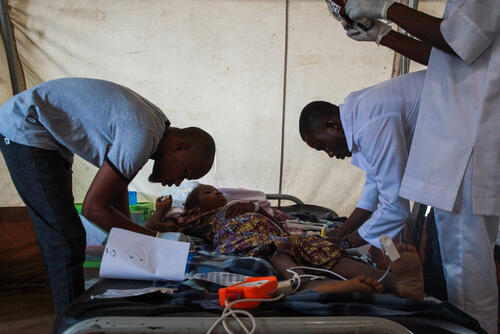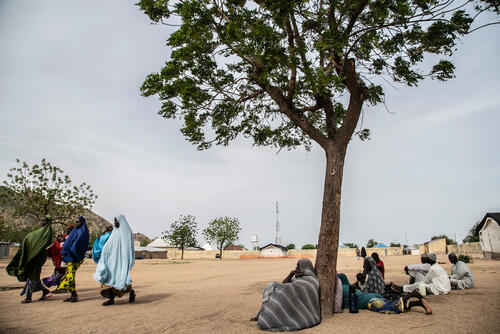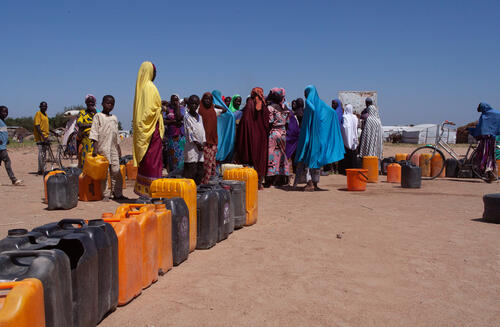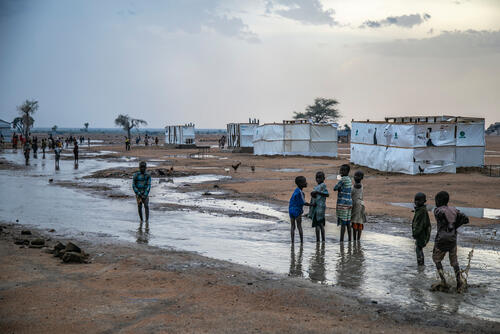Each year Borno state, Nigeria, sees a massive spike in malaria during the rainy season, most severely affecting children under 15. A combination of limited or non-functioning health infrastructure, inadequate preventive measures, and obstacles in reaching healthcare providers have created a situation where malaria-related deaths are all but inevitable.
Over 10 years of conflict between the Nigerian military and armed opposition groups have compounded the challenges people face in accessing healthcare, with vast swathes of people displaced, and millions of lives disrupted.
From July to December this year, MSF has provided over 85,000 children under five with seasonal malaria chemoprevention (SMC); by providing anti-malaria drugs to those most at risk, the goal of SMC is to prevent people ever contracting malaria. In Bama alone, MSF’s malaria response included SMC for an average of 12,054 children, over four rounds of treatment, and more than 1,000 inpatient admissions for the treatment of severe malaria.
85,000
85,
This year we ran SMC and malaria treatment activities in Banki, Rann, Ngala, Pulka and Bama, as well as treatment for severe malaria and malaria with complications in the state capital, Maiduguri. Despite predictable spikes in malaria (more than 270,000 cases of uncomplicated malaria were recorded across Borno state in 2019) treatment services from organisations like MSF remain necessary, because patients have little alternative.
In Bama, a state-run comprehensive general hospital appears ready to admit patients. However, with few drugs or human resources, the treatment of patients in this facility remains rare for now. The costs of the public health system present an additional barrier for many, who simply do not have the means to pay for medical treatment.
This hospital represents the only permanent health infrastructure for the people of Bama, which is now home to some 35,000 internally displaced people due to the ongoing conflict, as well as the host population.
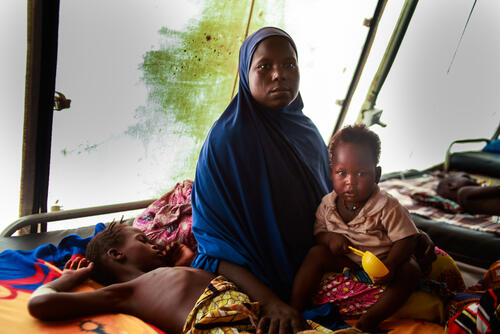
When Yagana brought her daughter to MSF’s malaria treatment centre in Bama in November, she spoke about the challenges in obtaining healthcare for her family.
“It’s not as if there are no other providers in Bama but MSF treats us without us paying anything,” Yagana said. “In other facilities, it is always paracetamol and a prescription to buy the mostly out-of-stock drugs in the drugstore, and we don’t have the money.”
The lack of functioning health infrastructure in Borno is further compounded by the number of medical cases seen in the state capital, Maiduguri. From July to November, our paediatric hospital in Gwange treated more than 5,000 confirmed cases of malaria, while MSF’s feeding centre for malnourished children in Fori admitted and treated 146 children with malaria, who were also suffering from malnutrition.
While there are other hospitals in Maiduguri, few offer secondary healthcare services, or secondary paediatric care services that provide treatment for complex malaria cases. Fewer still provide healthcare that the general population can afford.
If we become seriously ill here, there is nowhere to go. I have diabetes, but there is no-one here who can treat me.Famata, women's leader in Bama displaced people's camp
Despite starting as a project for the treatment of malaria, MSF’s work in Bama also grew to encompass more general paediatric secondary healthcare, admitting 192 additional patients for care due to the lack of treatment options for the population.
However, adults are also in need of healthcare services – women’s leader, Famata lives in an IDP camp in Bama, and is the first port of call in times of crisis for many women in the camp.
“If we become seriously ill here, there is nowhere to go. I have diabetes, but there is no-one here who can treat me,” says Famata. “I went to the general hospital here in Bama town – they tested me and told me I had diabetes, and then gave me a prescription for the drugs to buy – but I can’t afford the medicine.”
“Many women are also suffering from issues like fistula, but I don’t know where to take them; the same goes for HIV,” Famata continues. “I treat my diabetes by being careful with my diet – I only eat beans – but I really need drugs.”
The absence of comprehensive healthcare in Bama and other ‘garrison towns’ (towns that are inhabited and guarded by the Nigerian military) is a serious issue for the population, however, they remain visible and able to voice their concerns; if the challenges of those living in garrison towns are dire, it raises difficult questions over the healthcare situation for those outside of military-controlled areas with limited humanitarian support, many of whom are living in areas controlled by armed opposition groups:
“If the state health authorities are able to ensure the day-to-day functioning of their hospitals in towns like Bama, it would allow organisations like MSF to boost other aspects of healthcare coverage in Borno state, such as malnutrition, outbreaks of epidemic disease or maternity care,” says David Therond, MSF head of mission.
If greater healthcare coverage is to be realised, with fewer preventable deaths, more must be done to ensure that affordable healthcare services are available to the general populace in Borno. With an emphasis on appropriate human resources, and the provision of medicines, there is a lot more that can be done.
With the end of the rainy season and the peak of malaria prevalence, MSF’s project in Bama has now closed. MSF has been continuously working in Nigeria since 1996, and in Borno state since 2014. The organisation currently runs medical activities in eight states throughout the country. MSF first opened a therapeutic feeding centre in Bama in 2018 to treat malnutrition. From July to December 2019, MSF reopened the Bama project to treat severe malaria. From July to November, MSF provided SMC over the course of four rounds of treatment in the following locations:
Banki: 14,243 patients
Bama: 12,054 patients
Rann: 11,639 patients
Ngala: 35,533 patients
Pulka: 12,023 patients
*Note that the numbers given above indicate the averages of four rounds of SMC in each location.



